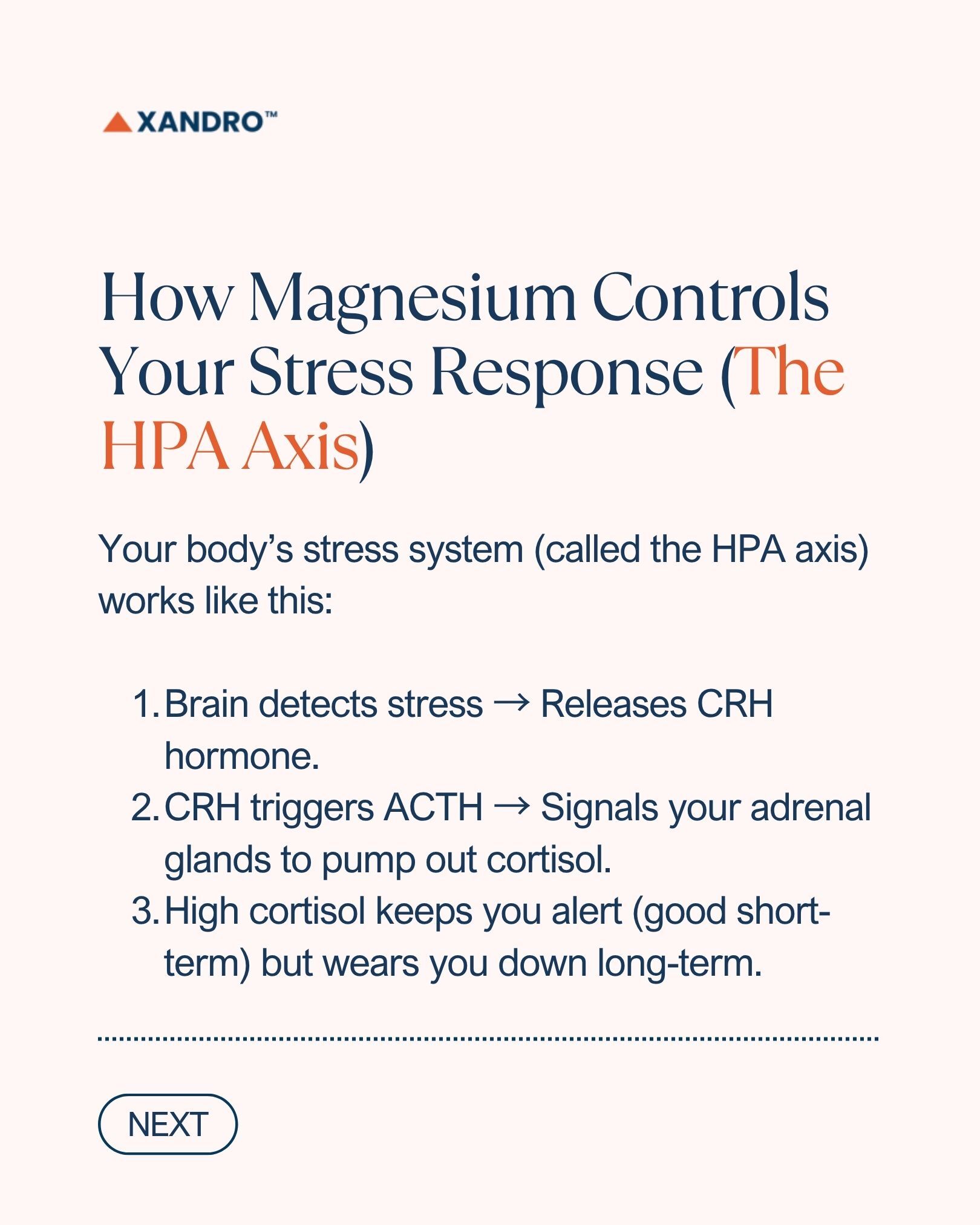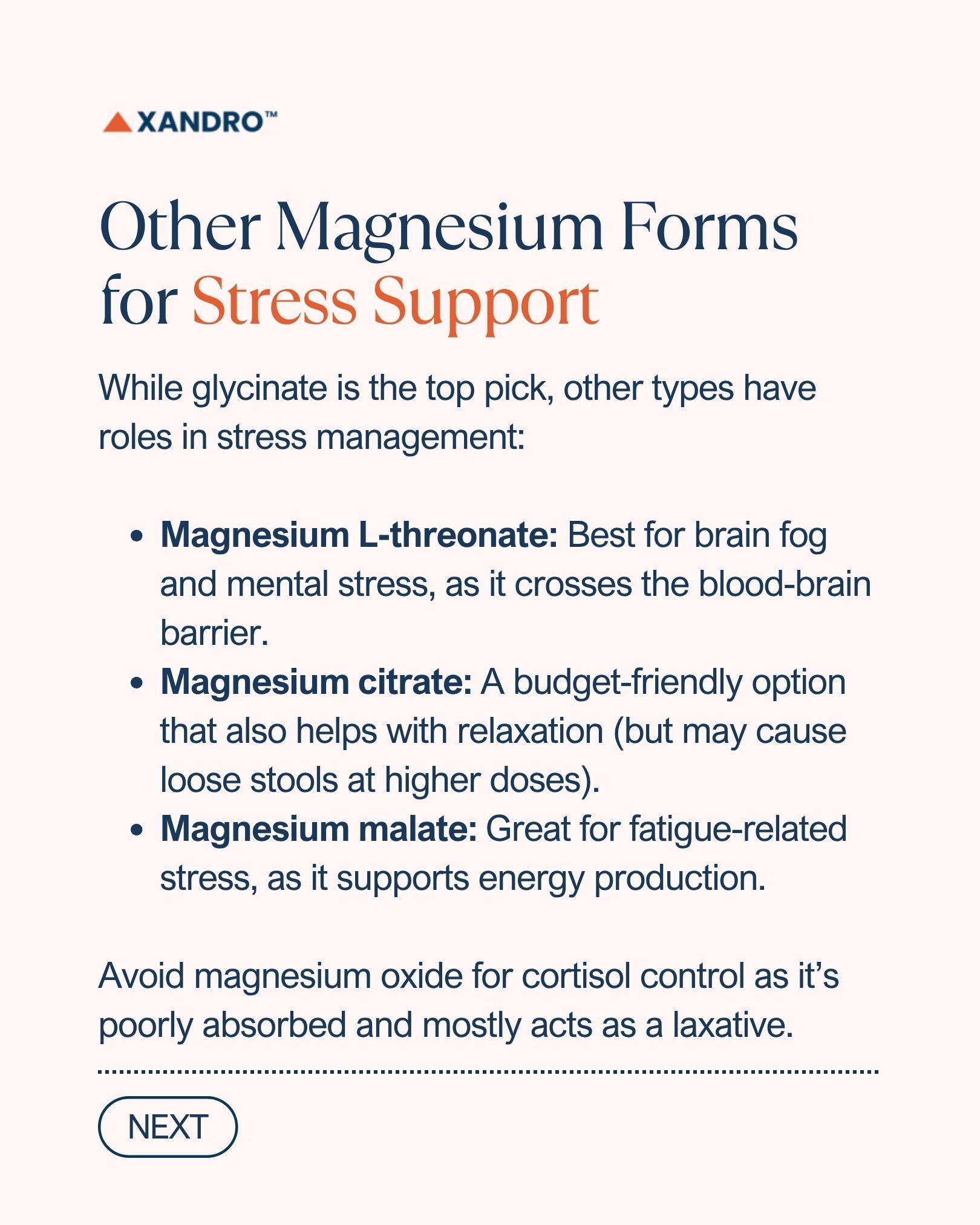Does Magnesium Help Cortisol Levels? Your Complete Guide
5th Jun 2025
Best Magnesium for Cortisol: Lower Stress & Anxiety Naturally
Cortisol is your body’s main stress hormone. It helps you react to danger, but when levels stay high for too long, it can lead to weight gain, anxiety, poor sleep and even heart problems.
The good news? Magnesium can help balance cortisol levels, reduce stress and improve overall health.
Some forms of magnesium, like magnesium glycinate, are especially effective for lowering cortisol and easing anxiety.
In this guide, you’ll learn:
- The Science Behind Magnesium for Cortisol Levels
- Which Magnesium is Best for High Cortisol?
- How Much Magnesium Glycinate to Lower Cortisol?
- What is the Best Time to Take Magnesium to Lower Cortisol Levels?
- Other Than Magnesium, What is the Best Supplement to Reduce Cortisol?
By the end, you’ll know exactly how to use magnesium for stress and anxiety, helping you feel calmer, sleep better and regain control over your cortisol levels.
Does Magnesium Reduce Cortisol? The Science Explained
What Studies Say About Magnesium and Cortisol
Research shows that magnesium supplementation can reduce cortisol levels:
- A 24-week study found that people taking 350mg of magnesium daily had significantly lower cortisol levels compared to a placebo group.
- Magnesium helps inactivate cortisol by supporting an enzyme called 11β-HSD type 2, which converts active cortisol into its inactive form.
- Low magnesium levels are linked to higher cortisol and increased stress sensitivity.
So, if you're stressed, magnesium helps your body process and lower excess cortisol before it causes harm
How Magnesium Controls Your Stress Response (The HPA Axis)

Magnesium steps in to:
- Block excessive CRH & ACTH (slowing cortisol production).
- Boost GABA (a calming brain chemical that reduces anxiety).
- Support cortisol metabolism (helping your body clear excess cortisol).
Without enough magnesium, your stress response stays stuck ‘on.’
You also lose more magnesium through urine (thanks to high cortisol), which creates a vicious cycle of stress → low magnesium → more stress.
Magnesium glycinate (the best form for cortisol control) can break this cycle and help your body handle stress better.
Why Stress Drains Magnesium (And How to Fix It)
Chronic stress depletes magnesium in two ways:
- Cortisol increases magnesium excretion (you pee it out faster).
- Stress burns through magnesium (your body uses it to calm nerves and muscles).
Signs you might be low in magnesium:
- Muscle cramps or twitches
- Trouble sleeping
- Anxiety or irritability
- Fatigue even after rest
How to break the cycle:
- Take magnesium glycinate the most absorbable form for stress relief).
- Eat magnesium-rich foods (spinach, pumpkin seeds, almonds).
- Reduce stress with exercise, meditation, or deep breathing (lowers cortisol naturally).
Further Reading: Can You Take Magnesium Glycinate with Alcohol?
Which Magnesium Is Best for High Cortisol?
Why Magnesium Glycinate Is the Top Choice for Cortisol
One of the best magnesium for cortisol levels is magnesium glycinate. Magnesium glycinate is magnesium bound to the amino acid glycine. It stands out as one of the best forms for lowering cortisol because:
- Superior Absorption
- Unlike cheaper forms (like oxide), glycinate absorbs efficiently without causing digestive issues.
- More magnesium reaches your cells to calm your nervous system and regulate cortisol production.
- Double-Action Stress Relief
- The glycine in magnesium glycinate boosts GABA (your brain’s ‘calm-down’ chemical), reducing anxiety.
- Studies show glycine improves sleep quality, which is important since poor sleep raises cortisol.
- Direct Cortisol Reduction
So, does magnesium glycinate lower cortisol? People taking magnesium glycinate often report better stress resilience, deeper sleep and fewer anxiety spikes, which are all signs of healthier cortisol levels.
Read here to learn about the difference between Magnesium Glycinate and Magnesium Bisglycinate.
Other Magnesium Forms for Stress Support

How Much Magnesium Glycinate Should You Take to Lower Cortisol?
Finding the right dose of magnesium glycinate is key to balancing your cortisol levels without unwanted side effects. Most research shows that 200–350mg (you shouldn’t take more than 350mg of supplemental magnesium each day) of elemental magnesium daily is the sweet spot for stress relief and cortisol control.
While the recommended daily allowance for magnesium for adults is between 310 and 420mg, for supplements, start with 200mg per day for the first week to assess your tolerance, then gradually increase if needed. Studies like the 24-week trial showing cortisol reduction used 350mg daily, which makes a good target for most people dealing with chronic stress.
During periods of extreme stress (like work deadlines or personal crises), you might benefit from temporarily increasing to 400mg daily (speak with your doctor first!), but this should be short-term. Higher doses aren't necessarily better, as your body can only absorb so much at once and excess magnesium gets excreted.
Magnesium glycinate is gentle on digestion, but taking more than recommended can still cause loose stools in some people. If this happens, simply reduce your dose slightly or split it between morning and evening.
For general health, learn how much magnesium glycinate to take each day.
When Is the Best Time to Take Magnesium to Lower Cortisol?
Timing matters because cortisol follows a natural daily rhythm. For most people, taking magnesium glycinate about 30 minutes before bedtime works best because:
- It helps lower elevated evening cortisol that can interfere with sleep
- The glycine enhances GABA activity for deeper, more restorative sleep
- Better sleep itself helps regulate next-day cortisol production
If you're someone who wakes up with intense morning anxiety or ‘stress hangovers,’ though, taking 100–200mg first thing in the morning can help smooth out that cortisol spike. Some people do best with a split dose (part in the morning and part at night).
Avoid taking magnesium with calcium-rich foods or supplements, as calcium can interfere with magnesium absorption. For best results, pair your magnesium routine with other cortisol-lowering habits:
- A 10-minute morning meditation
- Daily movement (even just walking)
- Cutting back on afternoon caffeine
- Eating magnesium-rich foods like pumpkin seeds and spinach
Tip: If you're using magnesium glycinate for both cortisol control and sleep, take it consistently at the same time each night for at least 2–3 weeks to see the full benefits. Cortisol regulation doesn't happen overnight, but the built-up effect can be transformative for your stress resilience.
Other Than Magnesium, What is the Best Supplement to Reduce Cortisol?
There are also other helpful supplements to help with cortisol levels. If you're looking for extra support beyond magnesium, these supplements may help keep stress hormones in check:
- Ashwagandha: This ancient herb helps your body adapt to stress and may lower cortisol levels by up to 23 per cent with regular use. Try Xandro’s Shoden® Ashwagandha for superior absorption.
- Omega-3s: The good fats in omega-3s can reduce morning cortisol spikes and help with stress-related exhaustion. Try LPC Neuro, an omega-3 supplement using LYSOVETA, and one that crosses the blood-brain barrier, unlike regular fish oil supplements.
- L-Theanine: Found in green tea, this calming amino acid can lower cortisol within hours while promoting relaxation without drowsiness, so it’s great for daytime stress relief.
Each of these works differently but can complement magnesium glycinate for better stress management. As always, check with your doctor before adding new supplements to your routine.
End Note
Your Action Plan for Lowering Cortisol with Magnesium
If stress has left you feeling wired, tired, or constantly on edge, magnesium glycinate could be the natural solution you’ve been looking for. By now, you know that:
- Magnesium glycinate can lower cortisol, plus, it’s gentle on your stomach, highly absorbable and packed with calming glycine.
- 200–350mg per day is a good dose as it’s enough to help balance stress hormones without side effects.
- Taking it at night works best for most people, helping you unwind and sleep deeper while keeping cortisol in check.
But magnesium works even better when paired with smart lifestyle habits.
Ready to Take Control of Your Stress?
For a high-quality option, try Xandro Magnesium Glycinate 500mg, with 100mg elemental magnesium. With the perfect dose of calming magnesium and glycine in each capsule, alongside your diet of magnesium-rich foods, it’s designed to:
- Lower cortisol naturally
- Ease anxiety and help with relaxation
- Support deeper, more restorative sleep
Your body deserves a break from stress, so give it the magnesium boost it needs today.
